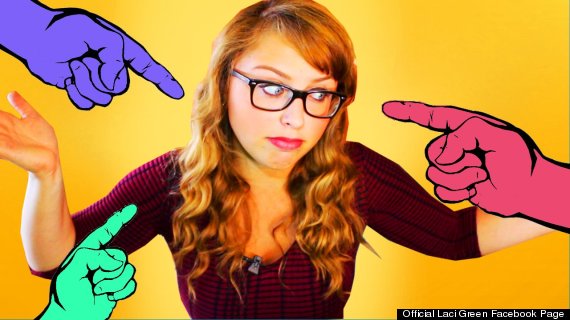
What does it take to get to the top — without losing your center? Our “Making It Work” series profiles successful, dynamic women who are standouts in their fields, peeling back the “hows” of their work and their life, taking away lessons we can all apply to our own. Laci Green is only 25 years old, but she has a YouTube channel with over 1 million subscribers, a partnership with Planned Parenthood and a new MTV web series. The sex-positive video blogger, peer sex educator and YouTube celebrity is based in the San Francisco Bay area, where she created her YouTube channel Sex+ during her first year at UC …
What does it take to get to the top — without losing your center? Our “Making It Work” series profiles successful, dynamic women who are standouts in their fields, peeling back the “hows” of their work and their life, taking away lessons we can all apply to our own.
Laci Green is only 25 years old, but she has a YouTube channel with over 1 million subscribers, a partnership with Planned Parenthood and a new MTV web series.
The sex-positive video blogger, peer sex educator and YouTube celebrity is based in the San Francisco Bay area, where she created her YouTube channel Sex+ during her first year at UC Berkeley in 2008. The channel, which Green started as a hobby, now reaches over 5 million people in 100 countries each month who watch the watch the Sex+ host discuss topics like sexuality, feminism, pop-culture and body image.
Green was born in Utah but moved to Portland, Oregon and, later, to California. She grew up in a Mormon household and after moving to California became very involved in the church. As she got older however, she started questioning the faith and the traditions it endorsed.
“While I was learning how to sew and do crafts and babysit, my male friends were becoming leaders in the church,” Green explained in an April 2013 video. When she asked one of her teachers why she couldn’t be a leader, Green said her teacher told her that God wanted her to have a different, “special” job: “Having lots of babies.”
“It started to feel like the church was actually not what I used to think it was and I left. And I felt free,” she said.
During college, Green partnered with Planned Parenthood in 2012 as a sex educator giving lectures at colleges across the U.S. And on Nov. 4, she debuted her new MTV web series “Braless,” which, as Green described it over the phone, brings “an academic take on pop-culture issues” to its viewers.
Green spoke to The Huffington Post about how she defines success, why she does the work she does and how she keeps the haters at bay as a feminist on the Internet.
I’ve seen the first episode of “Braless” and it’s awesome. What’s the overall goal of the project and what sort of topics are you planning to talk about?
The main overarching theme is that we’re doing a pop-culture analysis through the lens of gender and sexuality studies. It’s more of an academic take on pop-culture issues. I’m not sure what all of the topics will be yet but we’re kind of playing around with it to see what works. It’s really exciting. MTV is very cool about it, they really want to start these conversations and engage their audience.

Why do you do the work that you do?
Well, because I think that it’s really important. I think that these kinds of issues affect everyone in society in any number of ways. For some people it’s really overt and some people have trouble facing it. “The issue of equality affects everyone’s quality of life.” You don’t really realize it until someone points it out to you. The issue of equality affects everyone’s quality of life. My long-term philosophy about it is that by working together — and not just me, but lots of other people who are voices in this space — we can make a positive change so that the world’s a little bit better when we leave it.
How do you define success?
Success would be any number of things. From starting a conversation at a university who has a campus rape problem, to just starting a conversation on someone’s Facebook wall. I think that anytime people are talking, that is success. And the more people that are talking, the more successful it is.
So by that definition, I would assume you consider yourself successful?
Yeah, I do think that I’ve been successful in trying to accomplish that goal.
Sorry I just tricked you into a humblebrag, but you’re doing great so you should be able to say so.
You gotta own it, right?
Most definitely. You discuss feminism a lot on your YouTube channel Sex+. I’m wondering how you deal with the seemingly inevitable backlash. Do you deal with a lot of trolls and hate mail?
Anyone who talks about these issues online — especially in spaces where nobody is held accountable for what they say or do — faces a number of different issues, from being trolled (even though I really don’t use “I think the fact that when people attack [feminists], it’s a sign of our own power. We are obviously threatening them in some way and threatening that ideology.” that term) to being harassed all the time. I’ve had to move, I’ve had restraining orders — there’s been a lot of messed up stuff that’s happened behind the scenes. And my perspective is that I just have to do what I can to stay safe, because otherwise they succeed at exactly what they’re trying to do, which is to silence me and keep me from talking about these things. I think that when people attack [feminists], it’s a sign of our own power. We are obviously threatening them in some way and threatening that ideology. I just try to stay positive about it.

On HuffPost Women we closely followed the Sam Pepper controversy back in September, when he “pranked” unsuspecting women by grabbing their butts and filmed their reactions. As a feminist and a sex-positive vlogger who’s also in the YouTube world, what was it like to watch that all go down, and what made you decide to respond to him directly in a video blog?
The whole thing started out as horrifying, with tons of confusion and stress about what to do. And then when I realized what needed to be done it was a terrible pain in the ass, honestly. The problem with the Sam Pepper thing was that no one was really willing to say anything about it. It was about to be brushed under the rug. And I started getting these really heartfelt emails and having these conversations with women about how deep this problem really went. It’s one of those moments where you’re like, “This really sucks, but I have to do it. I have to handle it.” So it was really stressful and it’s still stressful, but I’m glad to be helping the people who are involved in it. And I just hope that it’s made some difference for them and that it’s going to change the way that people think about people like Sam Pepper. Hopefully it helps people attract a more critical eye toward their actions, especially in person.
Who is your role model?
I don’t think I have any one particular person. I think that I see traits in lots of different people that I like from bloggers to TV personalities. I’ve never been one to idolize, I guess. Just a head down, get it done type of mentality.

What would you say to people who choose not to identify as feminists?
I think it depends on their reasons. I think that anyone who understands what feminism is, if they’re a decent human being, there’s really no reason not to identify as a feminist. But I do understand that it comes with baggage for people; that it can be alienating for some people who live in communities where the word feminist is still viewed as a bad word. I think it’s OK to identify however you want. I would, however, urge them to be critical about why they don’t identify as feminists. If they agree with the causes of feminism, but they don’t necessarily call themselves a feminist then I’m OK with that too.
What’s the best piece of advice you’ve ever been given?
I don’t know who this quote is from, I’ve seen it attributed to Jesus which is funny because I’m not Christian or anything but it’s something that comes up again and again in my work. The quote is “I never said it was going to be easy, I only said that it would be worth it.” When I’m feeling kind of down, that’s a really good way to keep things in perspective. It’s a really great way to keep your eye on the big picture and try not to get too involved in the little challenges that happen along the way.

What’s next for you in your career and what are you most excited to do?
There’s definitely going to be some branching out to other forms of media. That’s about the extent of what I can say about it right now. I think that YouTube will always be a part of my work and a part of my life, but I hope that I can get onto other platforms where these messages and conversations haven’t been started yet.
This interview has been edited and condensed.
Visit site:
Laci Green On Her New MTV Series And Dealing With Backlash As A Feminist On The Internet





















